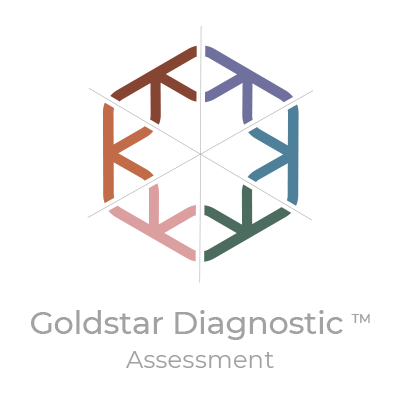Buying with confidence: a guide for School Leaders
)
As a school leader, choosing between the myriad of EdTech products in the marketplace that often make similar claims about their educational impacts, can be both complex and time-consuming. Everyone would like a clear signal that can indicate both trustworthiness and product quality. Fortunately, Goldstar™ Education has developed a way to clearly demarcate the EdTech to trust by identifying those companies that are most likely to deliver on their education promise.
We began our research at UCL Institute of Education, voted No1 in the world for its education research, looking for a better set of metrics to evaluate EdTech products and services. This resulted in the groundbreaking conclusion, in addition to having evidence that their products work, EdTech products should be built by companies that have “6 Superpowers.”
6 Superpowers of Trustworthy EdTech Companies
So why is it so hard to know which EdTech products to trust? This is mainly because EdTech products are always evolving. Comparing education with the medical sector, you would always get exactly the same version of a vaccine that has been developed and trialed.
In education, we want our EdTech products to evolve to ensure they meet the unique needs of the learner, and are sensitive to different educational contexts. At the same time, we also want rigorous research evidence that the products work, which may not exist yet. Hence, we need much more sophisticated metrics to help us evaluate the claims for the EdTech products in the marketplace.
Our groundbreaking research results reveal the 6 Superpowers that EdTech enterprises need to foster to give confidence to the marketplace, that they are creating trustworthy EdTech products. By trustworthy we mean products that are most likely to deliver on their educational promise to learners.
What is unique about our approach is that, instead of only looking at efficacy data of a product at a moment in time, we also gather data on the processes, mindsets, capacities and assets in the company, which is what we call their Superpowers!

Our Diagnostic Assessment (an online digital tool) is completed by the enterprise leadership team to efficiently assess its Superpowers and score the likely effectiveness of their EdTech product. The resulting A-E score indicates an overall level of trust for that product, which help inform procurement processes and makes it clear which EdTech to Trust.
Don't Forget: Buyers Rule!
As a leader, you can do your part to raise the standard of EdTech products. As buyers, you have the power to ask for sound evidence that the product works and question whether the research has considered learners in your context. If companies don’t have a good enough answer to your question, ask them to seek support (see list below) and come back to you when they can.
Professor Alison Clark-Wilson at University College London, an expert in EdTech research, says “The vast majority of EdTech companies are well intentioned and care about building products that improve education. However, the nature of the sector means that many companies claim educational outcomes that they might not yet have sound research to support. This does not mean that they are not on their way to gathering this evidence - the companies that score highly in the Goldstar Diagnostic are those that are willing to work with you to really understand how their products work in your context. This tips the balance of power back into the hands of buyers, but also supports the companies to know how they can develop their Superpowers, drawing on a range of support in the EdTech ecosystem such as EDUCATE Ventures, the EdTech Evidence Group, Digital Promise and more.”
3-Step Guide to Purchasing EdTech
- Make sure the product has the features you are looking for and is aimed at learners like yours.
- If it meets your initial criteria, ask the company if they have any research evidence that their product works. The key is to ask who their research participants were to check if their context is similar enough to the context of your own learners.
- If you like what you hear you can go into more depth with one of the following options:
 a) Ask the companies to get a Goldstar Diagnostic Assessment on the product you are looking to purchase. (If you have a budget, you can commission it, or you can ask the company to submit their results to you a part of the application process. Goldstar’s Diagnostic Assessment will give you a report with the score of the trustworthiness of the EdTech product, its suitability for your context and any red flags Goldstar sees, and the company will get a formative report to help them raise their standards. **Then, we recommend you make your purchase contract conditional on the company maintaining (or increasing) their score. As the company continues to add or change its features, you don’t want them to stop looking at the effectiveness of their product.
a) Ask the companies to get a Goldstar Diagnostic Assessment on the product you are looking to purchase. (If you have a budget, you can commission it, or you can ask the company to submit their results to you a part of the application process. Goldstar’s Diagnostic Assessment will give you a report with the score of the trustworthiness of the EdTech product, its suitability for your context and any red flags Goldstar sees, and the company will get a formative report to help them raise their standards. **Then, we recommend you make your purchase contract conditional on the company maintaining (or increasing) their score. As the company continues to add or change its features, you don’t want them to stop looking at the effectiveness of their product.
b) Take matters into your own hands and follow the Bett and EdTech Impact Buyer's Guide and the Digital Promise EdTech Pilot Framework, which offers extensive tips on this process.
Support for EdTech Procurement
- Goldstar Education Ltd. - Gain clarity on the claims of the EdTech products you are looking to purchase by commissioning the company to take a Goldstar Diagnostic Assessment.
- EdTechImpact.com - hear how your peers rate products.
- Bett and EdTech Impact Buyer's Guide - take matters into your own hands and follow their tips.
- Digital Promise EdTech Pilot Framework - a set of great resources with sample checklists and explainer videos to support you to pilot products you are thinking to buy.
If you are so inclined, you can refer companies that are of interest to support services so that they can increase their product quality:
About the author
 Dr. Anissa Moeini is an EdTech entrepreneur, social scientist and expert in the field of enterprise impact measurement. Anissa is Founder and CEO of Goldstar Education and Honorary Postdoctoral Research Fellow at University College London’s Institute of Education.
Dr. Anissa Moeini is an EdTech entrepreneur, social scientist and expert in the field of enterprise impact measurement. Anissa is Founder and CEO of Goldstar Education and Honorary Postdoctoral Research Fellow at University College London’s Institute of Education.
With a background in entrepreneurship, Anissa identified the need to build research capacity in EdTech enterprises that is both agile to their pace of change and adaptable to the rhythm of SMEs. Through her doctoral research, she developed the Evidence-informed Learning Technology Enterprise (ELTE) Framework as a practical tool for EdTech companies and other non-academic stakeholders (investors, policymakers and educational practitioners) to support the evaluation of the efficacy of EdTech enterprises; and to build their internal capacity to be evidence-informed.
In January 2021, Anissa founded Goldstar™ Education, whose flagship product, the Goldstar Diagnostic™ Assessment, measures the educational impact potential of products, offering clarity for buyers on what EdTech to Trust while offering purpose-driven companies guidance on how to pivot to better deliver on their mission.
Anissa completed her PhD at the UCL Institute of Education (World #1 for research in education 2014-2022) London, UK, her MA at Teacher's College, Columbia University in International Education Development with a specialization in Instructional Technology and Design, and her undergraduate in International Business (iBBA) at the Schulich School of Business at York University in Toronto, Canada.


)
)
)
)
)
)
)
)
)